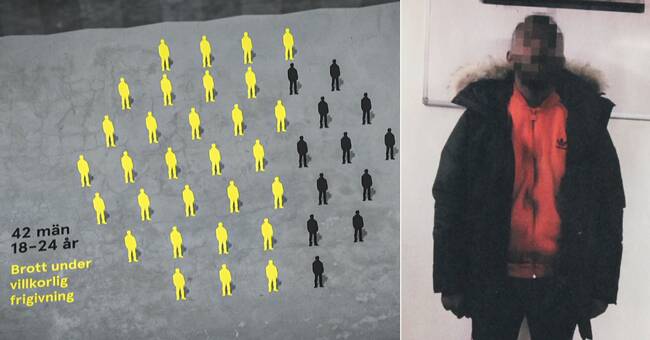The man in his 20s has several convictions in his luggage, such as a felony, robbery, drug crime and several cases of assault.
He receives 17 warnings during his time at Kumla.
The parole is postponed, but in July 2019 he is finally released on parole
In the next six months, he will mismanage contacts with the probation service and commit a long list of crimes.
But it takes time before the conditional release is affected.
Knives another man
During the autumn, he was arrested again and again by the police.
He receives a penalty order and a fine - which he does not pay.
After questioning, he is released again.
He is twice taken into custody because he mismanaged contacts with the probation service.
He receives a warning, but that does not stop his crime.
Four months after leaving Kumlaanstalten, he was arrested with cannabis, interrogated and suspected of breaking into schools and stealing computers.
He is released again.
Three days later, he stabbed another man in Tensta in northwest Stockholm - and was arrested.
In total, he has been released and arrested eight times in six weeks while serving his parole.
After six months in prison, he is sentenced to one year in prison.
17 reported to the police in prison
Assignment review has reviewed cases where young men between the ages of 18 and 24 have been conditionally released from Kumla between 2017–2019.
It turns out that 30 out of 42 have committed crimes during the parole.
- It is always with boredom that we see an inmate that we have invested in, who has promised that he will now go to a law-abiding life.
Seeing him return to the institution is not very encouraging for a prison warden or prison warden, says Jacques Mwepu, head of Kumlaanstalten.
In addition, 17 of the 42 have reported to the police during their imprisonment, often several times, among other things for violence and threats against fellow inmates or prison guards.
However, events that may be criminal must not be considered negligence, and do not affect the conditional release.
How do you feel about the release of people who have committed crimes at your institution? You release them even though they are suspected of new crimes.
- I think that the principle of non-double punishment should still apply, says Jacques Mwepu.
"Must be handled by the judiciary"
In Norway, Finland and Denmark, the risk of a recidivism can stop a conditional release - but not in Sweden.
A client at the probation service can also be suspected and even confess to a crime without the conditional release being withdrawn.
It is only if you break the rules of probation and do not come to meetings that it can have consequences.
- It is of course terrible to expose others to violence.
This applies to all crimes that have a crime victim, so to speak.
At the same time, we cannot take action solely for the reason that a new crime is suspected, says Henrik Svärd, head of probation in Mälardalen.
If you are taken for rough driving, for example, and confess, or if you are taken with a knife that you carry without having the right to it, or if you are taken with drugs, is that negligence? Is not that enough for you to act?
- No, it is the type of negligence that must be handled by the judiciary, because we have no conditions to hand out punishment.
If, on the other hand, it is combined with misbehaving in another way in the relationship with us that you do not come to your visits that you do not meet the conditions that may otherwise be set for the monitoring, we must act on that, says Henrik Svärd.
The report "Conditionally released" can be seen on SVT Play.

